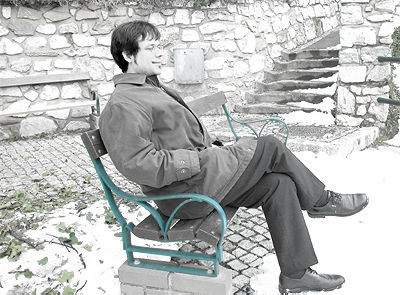 "The
word "interpreter" means "translator".
"The
word "interpreter" means "translator".
 "The
word "interpreter" means "translator".
"The
word "interpreter" means "translator".
In order to achieve the deepest possible effect on the audience, an interpreter should translate the message of the composer in a personal way.
It can be quite necessary to exaggerate the different elements of a composition, to reach - on the over stimulated audiences of today - the effect, which the composers wanted.
It is important that a translator - an interpreter - always puts the message of the composer in the centre and not himself. The interpreter has a responsibility to the composer and to the audience. The interpreter has a responsibility to himself too!
He should only interpret music in such a way of which he is himself convinced of - only so can he also convince the audience.
The first task of the interpreter is to understand the composition. He must hear the relationship of the tones to each other: feel the tension and relaxation of the rhythm (the short and long tones) and the metre (the recurring heavy and light beats);
feel the interval-tensions in the melody; the dissonances and consonances of the harmony and of the polyphony (part-writing); be able to hear, in the case of tonal music, how the harmonies relate to a tonal centre. The interpreter must be aware of the form of the composition, be aware of the phrases of the melody and its hierarchic structure into still bigger units. In addition, he should feel how the melody employs the whole gamut of the diction of language: taking breaths of different lengths, posing questions, giving answers and making exclamations. He should simultaneously follow the bass and the inner voices in the same way - they are melodic as well.
The next step is that the interpreter must understand and feel the character of the individual parts and how these relate to each other and to the piece as a whole.
Furthermore, in order to be able to interpret the notation of a composer correctly, an interpreter must acquire knowledge of the performance practices of the respective time of the composer.
If I learn a composition, I employ my practice time mainly to understand it and to feel it correctly. To this end, I shun no hard work. I learn to sing all voices by heart by their tone-names, i.e. not only the upper part but also the bass and inner voices. These parts I sing meanwhile I play the piece. Further, I examine the harmonies, the counterpoint, the form and all other elements of music already mentioned - first every element by itself and then in combination. Hereby, I insure myself that nothing escapes me in the composition, that I perceive all tones consciously and their relation to each other. This is always the basis for my interpretations.
I live with the composition, breathe it, hear it in my head during the day.
Many good
hints on musical interpretation one gets if one compares language and music. For
example, words and syllables are emphasised by lengthening them - in exactly the
same way, one can emphasise important tones and passages in music by lengthening
them. Further, with the spoken word, one can deliver the same message in very
diverse ways, or can, in the case of for instance a poem or a drama, present
identical words very differently.
This raises the question of the freedom of the interpreter. If one feels the relationship of the tones of a composition, then every performance of the composition can and should be different - but the relation of the tones to each other must remain. A performance of the composition then amounts to an improvisation - a continuous recreation of it.
The interpreter should during a performance only listen to the music in the given acoustical situation and let "it" play. If the preparation of the interpreter was correct and no hampering and blockading forces are in him, he can become an instrument for higher forces - forces which exist in all human beings."